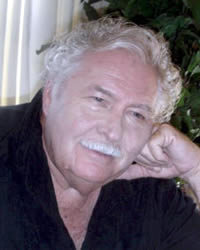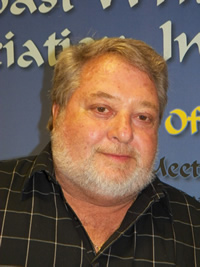A Place No One Should Go DL Havlin
Interview by Joanne Tailele

Interview by Joanne Tailele
WORD SONG INTERVIEW: GWEN BROWN
by Gary McLouth, Associate Editor
I met Gwen Brown at Perkins restaurant at the corner of San Carlos and Summerlin to ask the questions about life and writing that might provide some information and inspiration for this Word Song Spotlight interview. I like to ask questions I don’t know the answers to, and Gwen did not disappoint me. In fact, my blank slate began to fill in with surprising, oral sketches of a life on the move.
Gwen Brown says she’s always been driven by the sense “that something must be going on somewhere else.” From her home town, Mishawaka, Indiana to her current home in Fort Myers, Florida, Gwen’s adult journey can be charted along the network of stops in between. In the telling of the story, chronological details dim in the highlights. In no particular order, Chicago for nursing, California for marriage, Arizona with artist husband. Then, New York City.
“I always wanted to act. I knew a full-time job wouldn’t allow much time for major investments of time in other activities, so I decided to put my efforts into teaching, which would (theoretically) give me summers for acting… I remember sitting on my suitcase in New York, and thinking, ‘I’m home’.”
My first follow-up question to fill in the blanks between Arizona and New York, her marriage and her career got re-directed by Gwen’s own follow-up: “If you can’t find it there, you can’t find it anywhere, and it’s true. I worked on my Master’s degree at Columbia, so I could teach medicine and surgery, which I did eventually, at Brooklyn College, New York University and Long Island University.”
Gwen fed her acting ambitions by studying and performing in showcase theatre. Through showcase, she was discovered for Repertory theatre by Director John Lithgow and she got to play an understudy role to Meryl Streep. As if that wasn’t thrilling enough, Gwen played on stage with Lynn Redgrave in St. Joan, and in The Trip Back Down with John Cullum.
“I was so happy, it blew me away. Broadway!”
Gwen played in a number of Off-Broadway plays, too. In the process, she married a singer-song writer who encouraged her to pursue her stage career further, but that story line will have to wait for future development. What Gwen Brown, the writer, wants to do now is write a book about her sister, the only woman buried in the ancient catacombs of Jerusalem. Come again?
“My sister’s life is an incredible story about an incredible woman. She died in 2002, and I intended to get started on my book about her, but I couldn’t get the first sentence out of myself. When Bob McCarthy handed out those yellow pads and said: WRITE! I started my book, and I’ve been writing every day since.” Gwen has gotten very close to her sister by reading the many stories her sister wrote but shared with no one while she was alive. Being able to immerse herself in her sister’s stories has given Gwen new perspectives on her sister and on her own writing.
“It’s amazing to me, how much I’ve learned that I didn’t know happened to her. I never knew anything about her love life, or how she converted to Catholicism and became a nun. Someday, you’ll be amazed, too, when you read my book,” she laughs.
Most writers keep well-ordered memories of their inspirations and practices at the ready for telling. Each one of us can plug into moments of the distant past with the energy and focus of the present. Gwen is no different in that regard, but in the same vein, hers is a whole new story.
“Oh, I used to write poetry to get things out of my system. I learned a little poem in the 4th grade, and I’ve loved it ever since.” Gwen recites the poem for me and promises to email me a copy. “It’s by anonymous,” she says, “my favorite author.”
The Poem, by Anon
When first I loved,/I gave my very soul/Utterly unreserved/To love’s control//But love deceived me/Wrenched my youth away/And made the gold of life/Forever gray.//Long I lived lonely/Yet I tried, in vain/With any other joy/To stifle pain//There is no other joy/I learned to know/And so returned to love/As long ago//Yet this little while/Ere I go hence/I love very lightly now/In self-defense.


by Gary McLouth, Associate Editor
March 4, 2016
Henry Heitmann, author of Pocket Full of Tales; More Tales and Bits and Pieces; Looking Back On Life, all published by Monarch Books, Florida.
Henry (Hank) Heitmann has garnered a number of writing contest awards during the last few years from The GCWA of Mississippi, The Florida Weekly (poetry), Dreamquest Summer 2015, and the ABC 2016 Anthology of Florida Writers and Poets Competition.
Hank and I met for talk, breakfast and coffee at Marko’s Diner on San Carlos Blvd., recently. I was pleasantly surprised by Hank’s South Bronx accent, a near total contrast to the quiet voice in his poetic reflections and his poignant “Tales.” His educational experiences with Special Ed. students and teachers provided Hank with all kinds of stories. He admits that he’s been telling the stories for years, but he decided as soon as he retired that he would start writing them.
I stir more milk into my coffee and ask him how it’s going. Hank’s big brown eyes roll up at me.
“What I’ve heard and seen is what I try to get down on paper. The stories have been working my head for a long time, and retirement seemed like the time to write them out so I could share them. My wife encourages me, luckily, without her, I don’t think there’d be many stories written down.”
“I went to a GCWA meeting about five years ago and just randomly sat down next to Ken Feeley. Over a few meetings, he became my mentor. I also got valuable feedback from Ruben and Tim. I met other writers and learned about publishing and writing from them. What ended up happening… GCWA gave me the self-image of a writer, it put me in the midst of other writers, made me feel at home.”
Hank talked about his special relationship with books that began in his grandmother’s house back there in the Bronx. While other kids saved nickels for Bazooka bubble-gum, Hank saved up to buy books. What about books, now, I ask.
“I like to hold a book in my hand. Even with all of the Kindles and Nooks and variety of ‘pads’ and screens, there’s still room for paper. Keep in mind, books are less harmful to the environment.”
Really? I thought paper books cost trees. What do you mean, exactly?
“I’d rather spend money on books than money on weapons of war,” Hank says, and I don’t have a rejoinder beyond a grunt.
Since Hank has mentioned money, I wonder aloud how he’s doing with the writing-publishing-marketing cycle. He gives me the slow, sad look I’ve seen on the faces of many writers who thought the work of writing was the be-all-and-end-all, the brass ring at their fingertips. “Marketing,” his voice trails off. Hank has worked diligently to complete all of his beginnings. Three books have pretty much left his cupboard of drafts, bare.
“I want to write a novel,” he says, “got one started called Out of Nonna’s Kitchen, It’s a sort of mystery-cookbook story.” His eyes find mine to see if I get it. I’m hoping I don’t squint a doubting glance. I know how that feels, and he does too, as he explains the plot to me, which I promise not to reveal to anyone else.
Before we go, Hank signs three books for me, and since I’ve already read a number of his stories, I’m eagerly heading home for a “Hanksta” fix. A sample: Still Dreaming – “Sitting on the dock/In the early morning sun/The tiny ripples on the lake/Beating out a gentle rhythm/A part of nature’s breathing/And giving life to ancient daydreams.”
The breakfast at Marko’s is what gives Diners their beloved place in American lore. Hank has hardly touched his abundant serving of eggs, hash browns, sausage and gravy. “There’s a sense of permanence in print,” he says, “I can pass it along to my family and friends. A new found passion in life is a good thing.”